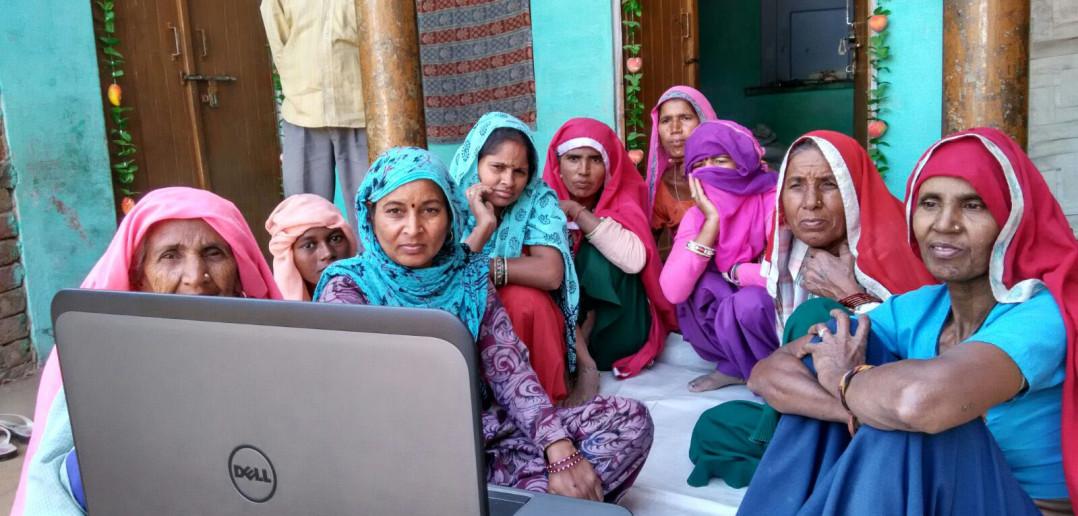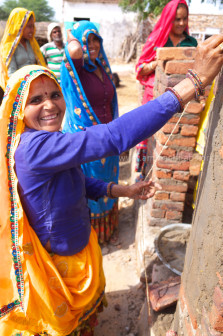Skill development, when combined with broader social and community goals, can achieve much more than employment. In this Skill Story, we get valuable insights into how AMMACHI Labs, Amrita University is transforming the lives of thousands of women and youth in rural India with technology enabled vocational training through the portal mySangham. Ajay Balakrishnan, Manager – Content Development at AMMACHI Labs, tells us more about the impact of the initiative and how they overcame constraints like infrastructure and literacy.
About mySangham
mySangham, our eLearning portal designed for low literacy users, has played a crucial role in the delivery our courseware. In the beginning, with the funding from NMEICT, we developed e-content for courses like plumbing and fabric painting in local languages and also a custom haptic device (a simulator) for construction training. in fact, this is the first simulator of its kind and it’s being used at L&T for construction training.
 How technology is being blended in training
How technology is being blended in training
In our blended learning model, locally hired subject matter experts (SME) and resource persons facilitate training using the technology solutions. The facilitators goes through a train-the-trainer (TTT) program at the head quarters.The solutions were initially piloted in remote tribal villages and rural communities of Kerala (Idukki and Kollam districts).We trained India’s first batch of female plumbers in 2011 under the Modular Employable Skills (MES) curriculum.
As we know, women have lots of responsibilities but are often marginalized from opportunities to earn a decent livelihood. The primary focus is on disadvantaged women in these communities since our principal goal is to make learning accessible irrespective of literacy and location.
Technology adoption in rural areas for vocational training
We realized that technology offers many benefits in terms of motivating and engaging students, standardization of content delivery, scaling up, reducing the dependency on SMEs and reduced drop out rates. We cannot just throw technology at rural audience and expect it works. The facilitator’s role is crucial and cannot be replaced. Its crucial that technology needs to be centered around the rural audience, incorporating User Experience (UX) and Instructional Design principles and delivered in local dialect to make it effective.
Scaling up and expanding the presence
The next step was to see how we could scale up our delivery. In 2012, we implemented a project under the United Nations Democracy Fund to train disadvantaged women in Kerala and Tamil Nadu to improve democratic participation through economic empowerment . In a year and a half we trained 3500 women using the same learning technologies. We provided them short term courses like jewellery making, soap making, fabric painting, vegetable cultivation, bag making, each integrated with life skill development to catalyze their ability to earn an income, and develop the confidence to utilize their newly found skills, and participate in their communities.
We managed to expand our training nationally since our parent organization MA Math has adopted 101 villages across India as part of its AmritaServe initiative to make villages self reliant.
How is this different from traditional ways of enabling livelihoods
So far, we’ve trained 4500 low literate disadvantaged rural women across 21 states of India in multiple trades. Our emphasis is on making them practice what they learn. We mentor them in post training sessions – on improving quality, packaging and marketing their products. We encourage them to hold expos and events to sell their products and craft. In their expo stalls, they learn how to interact with customers, pricing and placing the products.
This combination of Life Enrichment Education (LEE) and Vocational education was very effective in ensuring the students acquired the confidence to apply their newly acquired skills to earn their livelihoods.
The uniqueness of vocational training through sanitation projects
We have started to leverage skill development to address the problem of sanitation in India. We’re now training women in masonry skills to build their own toilets but also through LEE , teaching them about the importance of toilet use, hygiene and sanitation.
Initially we saw that the women didn’t want to spend their time unless they saw any use, as they mostly go for day jobs and they have their daily routines. So, they wanted to see the benefits. First, we taught them how to make their own building blocks, another skill from which they can earn their livelihoods. Slowly, we also saw that they were making the blocks and selling them. We had to demonstrate that any time they invest in training, they will be benefitted. But it was very difficult to convince them, in pan-India, we could never say one system works consistently across all states. In some places like Rajasthan, it was very difficult. Because it is a male dominated trade, the women don’t come forward and the community doesn’t support it.
So, culturally it’s a big challenge! How difficult was it to mobilize people?
When we go to villages, we see that several NGOs in the past have started different social projects. Apparently, many a times, these NGOs don’t deliver on their promises, so this creates a lack of trust among the people. So, gaining their trust is an initial challenge. It determines whether your program will go forward or not.
Hence, we engage with local administration, village elders and community groups when we organize these programs. And then, when the women gather, we explain them what we want to do; in some places 50 people show interest or in some places only 5. It’s a gradual process and we have to continuously be there, interacting with them. We meet their expectations and establish trust. Once this is achieved, they open up slowly.
The road ahead
Primarily, our focus has been on skilling women, because we wanted to take up one cause at a time and see to it end-to-end. Now, we want to expand it to youth in the villages. So, multiple activities are going on in AMMACHI labs, like the MoVE initiative (a solar powered van with tablets as a means to train in remote locations where it’s not possible to set up training infrastructure) , and using game based learning for social problem solving and so on. Our team is pretty excited about making it all happen!














Indeed such technology driven approach will improve & transform the livelihood of people at rural sector, and enable the community as a whole to become self-dependent with economic & social empowerment.